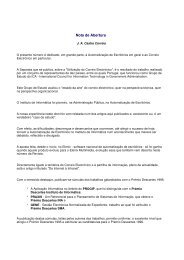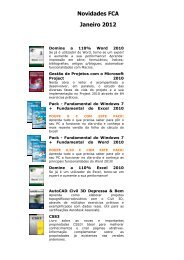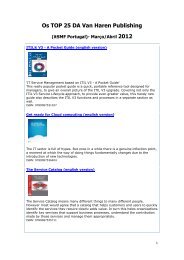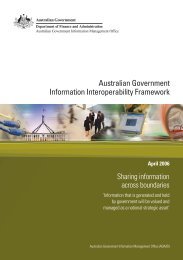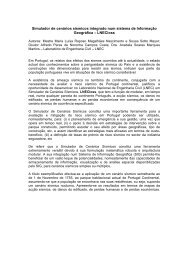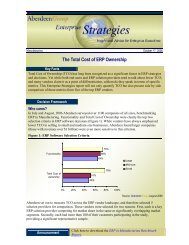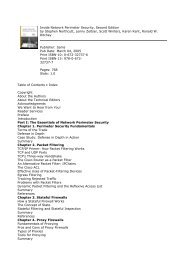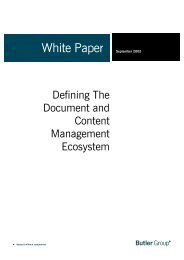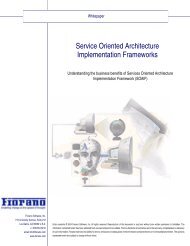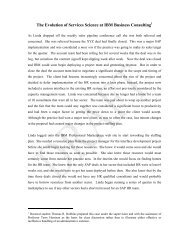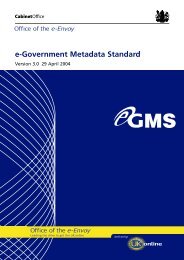OECD Peer Review of E-Government in Denmark - ePractice.eu
OECD Peer Review of E-Government in Denmark - ePractice.eu
OECD Peer Review of E-Government in Denmark - ePractice.eu
Create successful ePaper yourself
Turn your PDF publications into a flip-book with our unique Google optimized e-Paper software.
embrace and deliver e-government, some KMD systems are undeniably <strong>in</strong>novative. The best example<br />
<strong>of</strong> this is the e-Boks system, which has been widely acclaimed and is heavily used.<br />
Box 6.4 e-Boks<br />
e-Boks is a free electronic “mail box” service developed by KMD that allows Danes to electronically receive and<br />
save communications with both government and bus<strong>in</strong>esses. Almost all municipalities and many bus<strong>in</strong>esses are<br />
registered to use e-Boks as “senders”. e-Boks users can choose from whom they want to receive electronic<br />
communications, which are then securely filed <strong>in</strong> the e-Boks system. People can also store important electronic<br />
documents or objects, such as birth or marriage certificates, <strong>in</strong> their mail boxes. e-Boks is tied to the Danish CPR<br />
number, mean<strong>in</strong>g that documents can be saved <strong>in</strong>def<strong>in</strong>itely regardless <strong>of</strong> changes <strong>in</strong> users’ names, addresses<br />
(<strong>in</strong>clud<strong>in</strong>g e-mail address) and other contact <strong>in</strong>formation. The use <strong>of</strong> the CPR number by the e-Boks system is<br />
tightly regulated, and notification is always sent to the mailbox owner when the e-Boks has been used. It is<br />
possible to log on to e-Boks us<strong>in</strong>g either a digital signature or a p<strong>in</strong> code. Users can also log on via their onl<strong>in</strong>e<br />
bank<strong>in</strong>g service.<br />
Source: www.kmd.dk.<br />
Follow<strong>in</strong>g discussion <strong>of</strong> the relationship between e-government and the Structural Reform, one <strong>of</strong><br />
the issues most frequently raised <strong>in</strong> <strong>in</strong>terviews for this review was the role <strong>of</strong> KMD <strong>in</strong> the municipal<br />
ICT market and the impact this has on e-government. A wide range <strong>of</strong> <strong>of</strong>ten contradictory and<br />
polarized views was expressed, <strong>in</strong>clud<strong>in</strong>g:<br />
• KMD uses its position <strong>of</strong> market dom<strong>in</strong>ance to lock municipalities <strong>in</strong> to us<strong>in</strong>g outdated,<br />
expensive, and non-<strong>in</strong>teroperable (<strong>in</strong> terms <strong>of</strong> their alignment with the Danish enterprise<br />
architecture) <strong>in</strong>formation systems. It is also seen as unresponsive to customer demands, due<br />
to the fact that it faces little or no competition <strong>in</strong> many areas.<br />
• Municipalities’ heavy reliance on KMD has led them to under-<strong>in</strong>vest <strong>in</strong> develop<strong>in</strong>g the<br />
knowledge and skills necessary for effective and <strong>in</strong>dependent participation <strong>in</strong> e-government.<br />
• The existence <strong>of</strong> KMD is a vital element <strong>of</strong> successful implementation <strong>of</strong> the Structural<br />
Reform, as it will both provide for cont<strong>in</strong>uity <strong>of</strong> municipal operations while mergers take<br />
place, and support changed adm<strong>in</strong>istrative functions through various “structural reform<br />
packages” that many municipalities will rely upon as the basis <strong>of</strong> their ICT environment<br />
dur<strong>in</strong>g and beyond the Reform.<br />
• Widespread reliance on KMD allows for more cost-effective development <strong>of</strong> municipal ICT<br />
systems and applications, especially due to economies <strong>of</strong> scale. It also allows for more<br />
consistent levels <strong>of</strong> front- and back-<strong>of</strong>fice service provision across municipalities.<br />
• KMD distorts the structure <strong>of</strong> the municipal ICT market, which reduces competition, lowers<br />
quality, and <strong>in</strong>hibits <strong>in</strong>novation. This situation is said to be contrary to general Danish<br />
competition policy, and also to the <strong>Government</strong>’s plans to make the ICT <strong>in</strong>dustry as<br />
competitive as possible.<br />
The bias <strong>of</strong> comment was heavily towards the negative, with widespread emphasis on the view<br />
that KMD is a monopolist <strong>in</strong> most areas <strong>of</strong> municipal ICT and that it is thus, <strong>in</strong> a sense, currently the<br />
most significant common framework for municipal e-government. Commentators consistently noted<br />
that the effect KMD has on e-government is complex. They cited the usual downside effects <strong>of</strong><br />
monopoly, while also acknowledg<strong>in</strong>g benefits, such as the fact that KMD has provided the necessary<br />
ICT capacity to allow for relatively uniform implementation <strong>of</strong> many different municipal<br />
e-government applications and services. This is seen to have been <strong>of</strong> particular benefit to the smallest<br />
109



